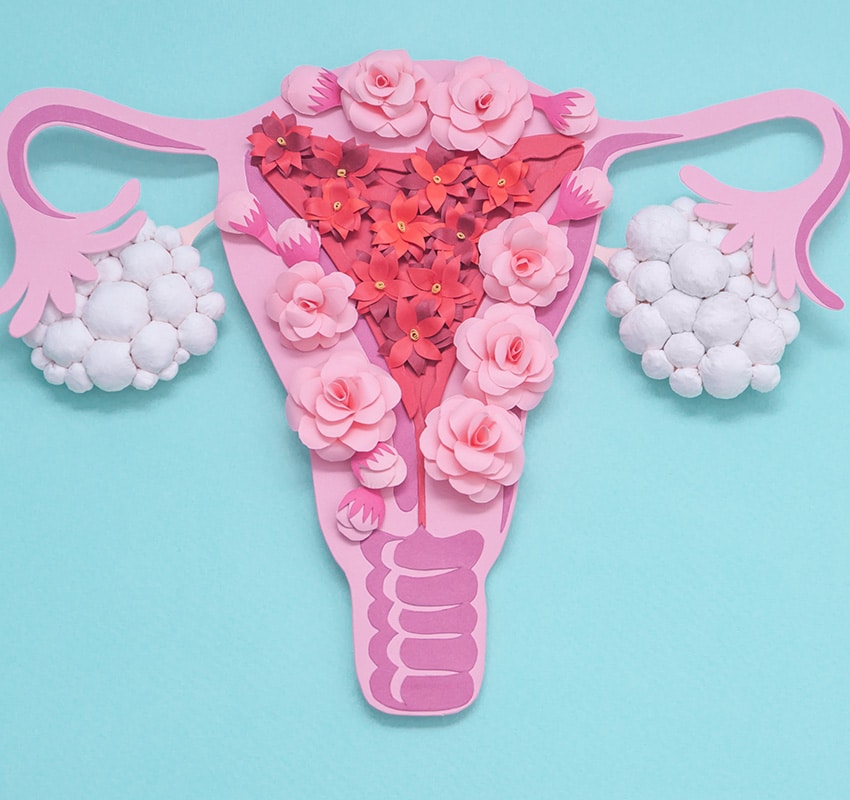Polycystic Ovaries Targeting Solutions
Polycystic Ovary syndrome (PCOS) is a common health condition that affects women of reproductive age. It’s caused by an imbalance of reproductive hormones, which can lead to problems with the ovaries. The name “polycystic” comes from the common feature of the condition – the ovaries become enlarged and contain many small fluid-filled sacs (cysts) which line the ovaries.
The exact cause of PCOS is unknown, but it’s thought to be related to hormonal imbalances that prevent the ovaries from producing eggs normally. This condition can affect a woman’s menstrual cycle, fertility, cardiac function, and appearance.
Symptoms of PCOS can vary, but they can include:
- Irregular periods or no periods at all.
- Difficulty getting pregnant due to irregular ovulation or failure to ovulate.
- Excessive hair growth (hirsutism), usually on the face, chest, back or buttocks.
- Weight gain.
- Thinning hair and hair loss from the head.
- Oily skin or acne.
Women with PCOS are also at increased risk of developing health problems in later life, such as type 2 diabetes and high cholesterol levels. There’s no cure for PCOS, but the symptoms can be treated, and a healthy lifestyle can help manage the condition. Treatment might include lifestyle changes like healthy eating and exercise, medications to control symptoms like hormonal birth control pills for regular menstruation and fertility drugs for those trying to conceive, and even surgery in some cases.
It’s important to see a healthcare provider if you have concerns about any symptoms that might be related to PCOS. The condition can be diagnosed through a combination of medical history, physical examination, blood tests, and sometimes an ultrasound of the ovaries. The diagnosis is usually made when at least two of the following are found: polycystic ovaries, irregular periods, and signs of high levels of androgens (male hormones), either in the blood or through physical signs like excessive hair growth.
We all know that people research their symptoms and medical conditions online prior to attending medical appointments. Looking for prevention, treatments, alternative therapies, medications, ways to manage symptoms and the likelihood of recurrence are just some of the frequently searched terms. This advertising is ideal for companies such as pharmaceutical companies, alternative therapies and healthcare providers looking to reach individuals who have Polycystic Ovaries.
Health Targeting is in our DNA
Since 2012, we’ve been the leader in Health advertising. Healthy Ads can deliver Health Targeting across publisher content in Real Time.
Reach Women with Polycystic Ovaries
We offer the ability to advertise on pages next to articles about Polycystic Ovaries. We know that people looking at content related to Polycystic Ovaries either have it themselves or know someone that does have it. They may also suspect they have it and plan to discuss their symptoms with their Doctor before been provided with information about treatment options. This is an ideal time for Direct to Consumer Advertising (DTC) for Polycystic Ovaries treatment options.
Polycystic Ovaries Targeting Solutions
Realtime Polycystic Ovaries Health Targeting
Our Realtime Polycystic Ovaries Targeting option allows an advertiser to run their advertising next to Polycystic Ovaries webpages as the researcher looks at the page. This is the ultimate solution for advertising Polycystic Ovary treatment options. We can run this type of contextual targeting across our own Managed Supply, our Curated Supply and via a Media Plan via Managed Services.
Popular Polycystic Ovaries Searches
We see a wide range of Polycystic Ovaries searches each month. The top twenty searches related to Polycystic Ovaries include;
- Polycystic Ovary Syndrome (PCOS) symptoms
- PCOS causes
- PCOS treatment
- Diet for PCOS
- PCOS and pregnancy
- PCOS and infertility
- PCOS and weight loss
- PCOS natural remedies
- How is PCOS diagnosed
- PCOS and insulin resistance
- PCOS and menstrual cycle
- PCOS and hair loss
- PCOS and acne
- Metformin for PCOS
- PCOS and birth control pills
- PCOS and hirsutism
- Lifestyle changes for PCOS
- PCOS and mental health
- Exercise and PCOS
- PCOS support groups
Health Targeting Categories
Discover a wide range of Health Targeting Categories based on Contextual Targeting for your next Advertising Campaign or Programmatic Deals. Explore our offerings in Medical Conditions, Healthy Lifestyle, Chronic Diseases, Infections, Sports, and General Health to reach your desired audience at scale effectively.











